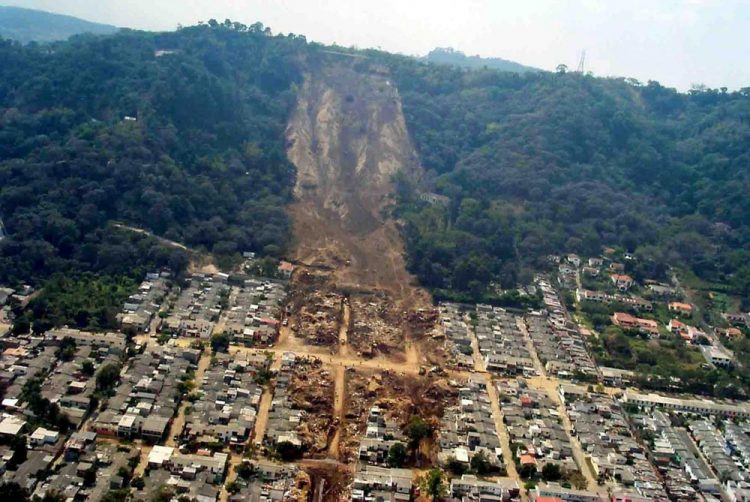IU researchers develop model for predicting landslides caused by earthquakes

An earthquake-induced landslide in El Salvador in 2001. Credit: US Geological Survey
A model developed by researchers at Indiana University can help experts address such risks by estimating the likelihood of landslides that will be caused by earthquakes anywhere in the world. The estimates can be available within minutes, providing potentially life-saving information to people who are affected by earthquakes and the agencies and organizations charged with responding to them.
“Earthquakes can be devastating, horrific and stressful events,” said Anna Nowicki Jessee, a postdoctoral research fellow in the IU Bloomington College of Arts and Sciences' Department of Earth and Atmospheric Sciences who developed the model. “The ultimate goal of this work is that fast, regional estimates of landslide occurrence would provide a way for those who are affected to receive the aid they need more quickly and efficiently.”
The model, based on data from past earthquakes and landslides, will be incorporated into the U.S. Geological Survey's Ground Failure tool, which will be part of the USGS earthquake reporting system.
A paper describing the model has been published in the Journal of Geophysical Research: Earth Surface. Authors, in addition to Jessee, include Michael Hamburger and Scott Robeson of IU Bloomington and colleagues at the U.S. Geological Survey and the University of Twente in the Netherlands.
The model describes a mathematical relationship between where landslides happen and five key variables: how much the ground shook during an earthquake; the steepness of the ground; the type of rock affected; an estimate of how wet the ground is; and what type of land cover is present. The researchers tested multiple versions based on past earthquake-triggered landslides and selected the model with predictions that best matched where landslides occurred.
By entering data for ground shaking for a specific earthquake — available anywhere around the globe from the U.S. Geological Survey ShakeMap tool — scientists will be able to use the model to produce a map showing the probability of landslides in areas near the quake. Available within minutes, the results could provide this information quickly to agencies that assist affected populations.
Landslides are the third-largest contributor to earthquake deaths, after building collapse and tsunamis. From 2004 to 2010, earthquake-induced landslides caused an estimated 47,000 deaths. Damaging quakes often occur in remote and mountainous regions with limited transportation and communication networks, where landslides can block roads and impede emergency-response and relief efforts.
“The best part for me,” Jessee said, “is the idea that this product can be used to actually help people who are impacted by landslides caused by earthquakes.”
Media Contact
All latest news from the category: Earth Sciences
Earth Sciences (also referred to as Geosciences), which deals with basic issues surrounding our planet, plays a vital role in the area of energy and raw materials supply.
Earth Sciences comprises subjects such as geology, geography, geological informatics, paleontology, mineralogy, petrography, crystallography, geophysics, geodesy, glaciology, cartography, photogrammetry, meteorology and seismology, early-warning systems, earthquake research and polar research.
Newest articles

Trotting robots reveal emergence of animal gait transitions
A four-legged robot trained with machine learning by EPFL researchers has learned to avoid falls by spontaneously switching between walking, trotting, and pronking – a milestone for roboticists as well…

Innovation promises to prevent power pole-top fires
Engineers in Australia have found a new way to make power-pole insulators resistant to fire and electrical sparking, promising to prevent dangerous pole-top fires and reduce blackouts. Pole-top fires pose…

Possible alternative to antibiotics produced by bacteria
Antibacterial substance from staphylococci discovered with new mechanism of action against natural competitors. Many bacteria produce substances to gain an advantage over competitors in their highly competitive natural environment. Researchers…





















